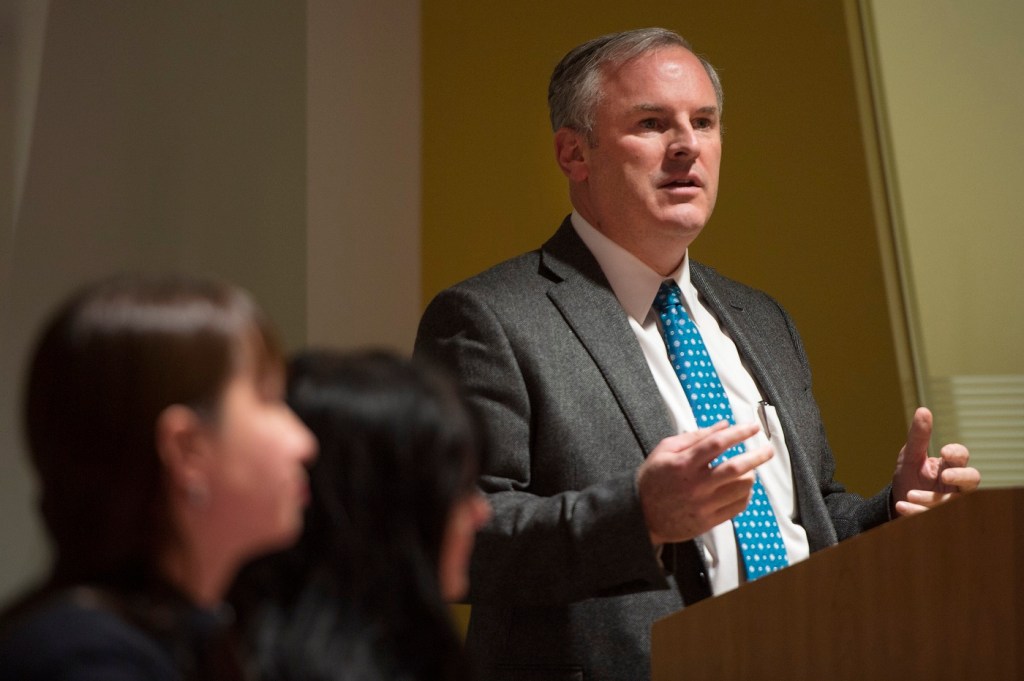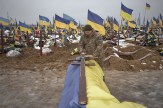Northeastern experts analyze recent terror attacks abroad

An interdisciplinary group of five Northeastern faculty experts reacted to and analyzed last week’s terror attacks in Beirut and Paris at a panel discussion Tuesday night.
More than 100 people, including many students, packed a standing-room-only suite in the Renaissance Park building for the nearly two-hour event, which was held just days after more than 40 people were killed in an Islamic State group suicide bombing attack in Beirut and then a series of attacks in Paris left at least 129 dead and some 350 more wounded. On Monday, Northeastern held a vigil to reflect and remember the victims.
Here is a summary of those remarks from the Northeastern faculty members in the College of Social Sciences and Humanities:
A resilient society
Steve Flynn, a professor of political science and director of Northeastern’s security and resilience studies master’s program, said that, unfortunately, our vulnerability is a reality, so our being empowered to deal with this vulnerability is a core competency necessary in the 21st century. But, he said, it’s one our society still struggles with. For example, he compared the encouraging stories coming out of France about how Parisians are coping with the tragedy to what he views as overreaction and in some cases a distressing politicization of these events by political leaders.
“It can be incredibly damaging to overreact,” said Flynn, who co-directs Northeastern’s George J. Kostas Research Institute for Homeland Security. “Instead, what we need in these times of tragedy is to refocus on what we value and how we safeguard those values and advance those values in the context of risk.”

More than 100 members of the Northeastern community attended the panel discussion. Photo by Adam Glanzman/Northeastern University
Europe and the Middle East
Mai’a K. Davis Cross, assistant professor of political science and international affairs whose research focuses on European politics, noted that earlier Tuesday France invoked a never-before-used EU “mutual-defense clause” in the wake of the attacks. The clause, which is article 42.7 of the EU’s Lisbon Treaty, states that if a member country “is the victim of armed aggression on its territory,” other members are obligated to provide aid and assistance “by all the means in their power.”
Cross posited that while this may be seen as merely symbolic, in part because other countries have already moved to help track down the perpetrators, that this “is a pretty strong step” for the EU.
For her part, professor Valentine Moghadam, who directs the international affairs and Middle East studies programs at Northeastern, noted that what she described as misguided U.S. and European foreign policies are responsible for instability in the Middle East. She argued that the war on terror, invasions, and drone strikes has merely brought about civilian deaths, violent jihadists, and the unraveling of development in countries like Iraq, Syria, and Libya.
“Our world system, dear students, is broken,” she said, adding that a new one is needed in which globalization is people-oriented not profit-oriented.
The reaction to terrorism
Denise Garcia, an associate professor of political science and international affairs, said the two paths taken thus far to address the Islamic State group threat—one of military, the other of negotiation—have been pursued in problematic ways. If military action is to be taken, she said, it must be recognized as legitimate by the international community.
“It must be vested in legitimacy and anchored in international law and conduct norms,” Garcia argued.
Max Abrahms, an assistant professor of political science, discussed his research on terrorism theory, particularly his pioneering work studying how governments respond to terrorism. He said his research has found that terrorist groups, contrary to conventional wisdom, very seldom manage to achieve their stated political goals. He also found that certain types of violence are more effective for the perpetrators than others.
Indiscriminate violence against civilians does not cause governments to “soften up,” Abrahms argued, pointing to both France and Russia responding to recent attacks with heavy bombing campaigns.
During a Q&A, the experts fielded a range of questions, including several on the appropriate response to the Islamic State group violence and whether international law is outdated to deal with this type of threat.
Abrahms noted the difficulties in counterterrorism, saying precision is key to neutralize a threat but not create a new one by harming non-combatants.
Flynn argued that if governments are granted more authority to respond to the new and evolving threats of the 21st century, that authority must be balanced with a matching level of accountability. He said that while a military response may be necessary, it should not be made the public face of the response. Instead, improving societal resilience should be front and center.





